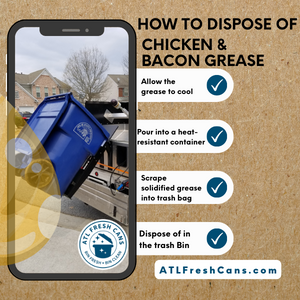Introduction
Welcome to the vibrant city of Atlanta, Georgia, where Southern hospitality meets a booming metropolitan lifestyle. As residents of this beautiful city, we strive to keep our homes and neighborhoods clean and green. One essential aspect of maintaining a hygienic living environment is the proper disposal of kitchen grease, particularly chicken and bacon grease. In this blog post, we’ll delve into the importance of responsible grease disposal, discuss the impact of improper grease disposal on trash bin cleanliness, and provide practical tips on how to keep your trash bins fresh and odor-free. Let’s learn how to make a positive difference in our homes and communities while keeping Atlanta shining bright!
Understanding Responsible Grease Disposal
Grease is a common byproduct of cooking chicken and bacon, but disposing of it incorrectly can cause severe environmental and sanitation issues. Pouring grease down the drain might seem like an easy solution, but it can lead to clogged pipes, sewer backups, and water pollution. Instead, it’s crucial to collect grease in a separate container and dispose of it properly.
The Impact of Improper Grease Disposal on Trash Bin Cleaning
Improper grease disposal not only harms the environment but also affects the cleanliness of our trash bins. When grease-coated items are thrown into the trash, they can leak and seep into the other garbage, causing unpleasant odors, attracting pests, and creating a breeding ground for harmful bacteria. To maintain fresh and hygienic trash bins, it’s essential to tackle the issue at its source: responsible grease disposal. We use all-natural and organic products. Additionally, we use 15 times less water than manual cleaning. Our process collects wastewater to avoid contaminating public drain systems and the environment.
How to Properly Dispose of Chicken and Bacon Grease
Allow the Grease to Cool: After cooking chicken or bacon, let the grease cool and solidify. Never pour hot grease directly into the trash.
Use a Grease Container: Invest in a dedicated grease container, such as an old coffee can or a glass jar with a tight-fitting lid. Pour the cooled grease into the container after each cooking session.
Seal and Store: Ensure the container is tightly sealed to prevent any leakage or spills. Store the grease container in a cool, dark place away from direct sunlight.
Proper Disposal: When the grease container is full, it’s time for proper disposal. Look for local recycling centers or collection points that accept used cooking oil and grease. Many communities have initiatives to recycle grease for biofuel production.
Trash Bin Cleaning Tips for a Fresher Home
Regular Cleaning: Schedule regular cleanings for your trash bins to prevent the buildup of grime and odors. Quarterly cleanings are ideal for most households.
Bag and Seal Trash: Always ensure that all trash is bagged and securely sealed to prevent leakage or spillage.
Composting: Consider composting food waste whenever possible. Composting not only reduces the amount of trash but also enriches the soil and benefits the environment.
Conclusion
As responsible citizens of Atlanta, Georgia, and stewards of the environment, let’s prioritize the proper disposal of chicken and bacon grease to protect our city’s sanitation and beauty. By following these simple steps for grease disposal and adopting trash bin cleaning practices, we can make a positive impact on our homes and communities. Together, let’s keep Atlanta clean, green, and fresh for generations to come. Happy cooking and responsible grease disposal!
The Atlanta Guide to Responsible Grease Disposal and Trash Bin Cleaning
The Atlanta Guide to Responsible Grease Disposal and Trash Bin Cleaning
Facebook
Twitter
LinkedIn
As responsible citizens of Atlanta, Georgia, and stewards of the environment, let's prioritize the proper disposal of chicken and bacon grease to protect our city's sanitation and beauty. By following these simple steps for grease disposal and adopting trash bin cleaning practices, we can make a positive impact on our homes and communities.

